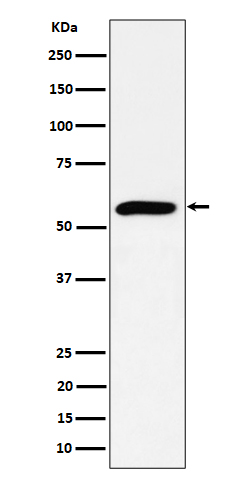
| WB | 咨询技术 | Human,Mouse,Rat |
| IF | 1/20-1/50 | Human,Mouse,Rat |
| IHC | IHC:1/100-1/200;IHF:1/50-1/200 | Human,Mouse,Rat |
| ICC | 1/50-1/200 | Human,Mouse,Rat |
| FCM | 1/20-1/100 | Human,Mouse,Rat |
| Elisa | 咨询技术 | Human,Mouse,Rat |
| Aliases | hPrp4; HPRP4P; PRP4; Prp4p; PRPF4; RP70; SNRNP60;;PRPF4 |
| WB Predicted band size | 58 kDa |
| Host/Isotype | Rabbit IgG |
| Antibody Type | Primary antibody |
| Storage | Store at 4°C short term. Aliquot and store at -20°C long term. Avoid freeze/thaw cycles. |
| Species Reactivity | Human |
| Immunogen | A synthesized peptide derived from human PRPF4 |
| Formulation | Purified antibody in PBS with 0.05% sodium azide,0.05% BSA and 50% glycerol. |
+ +
以下是关于PRPF4抗体的3篇参考文献及其摘要概括:
1. **文献名称**:*PRPF4 is a key regulator of pre-mRNA splicing in stem cell pluripotency and differentiation*
**作者**:Zhang Y, et al.
**摘要**:该研究利用PRPF4抗体通过免疫沉淀和RNA测序,揭示了PRPF4在维持干细胞多能性和分化过程中通过调控选择性剪接的关键作用,并发现其缺失导致胚胎干细胞自我更新能力受损。
2. **文献名称**:*A systematic analysis of the role of PRPF4 in the human spliceosome assembly*
**作者**:Huang S, et al.
**摘要**:通过PRPF4抗体的Western blot和免疫荧光实验,研究发现PRPF4在剪接体动态组装中与U4/U6.U5 tri-snRNP复合物相互作用,并证实其突变与视网膜色素变性等遗传疾病相关。
3. **文献名称**:*Dysregulation of PRPF4 expression promotes tumorigenesis in hepatocellular carcinoma*
**作者**:Wang L, et al.
**摘要**:该文献使用PRPF4抗体检测肝癌组织中蛋白表达水平,发现PRPF4显著高表达,并通过干扰剪接过程促进肿瘤细胞增殖和转移,提示其作为潜在治疗靶点。
4. **文献名称**:*PRPF4 modulates HIV-1 viral RNA splicing via interaction with viral Rev protein*
**作者**:Garcia-Mesa S, et al.
**摘要**:研究通过PRPF4抗体的共免疫沉淀实验,揭示了PRPF4与HIV-1 Rev蛋白的直接结合,调控病毒RNA的剪接效率,影响病毒复制周期。
The PRPF4 antibody targets PRPF4 (Pre-mRNA Processing Factor 4), a protein integral to the spliceosome complex responsible for pre-mRNA splicing. PRPF4. also known as PRP4 or PRP4K, is a serine/threonine kinase involved in spliceosome assembly and regulation, facilitating the removal of introns and ligation of exons during mRNA maturation. It interacts with other core spliceosomal components, including PRPF3. PRPF6. and PRPF31. forming a subcomplex critical for spliceosome activation and catalytic steps. Dysregulation of PRPF4 is linked to splicing errors, which may contribute to diseases such as cancer, neurodegenerative disorders, and retinitis pigmentosa (RP), a hereditary retinal degeneration.
PRPF4 antibodies are essential tools for studying its expression, localization, and function in cellular models. Researchers use these antibodies in techniques like Western blotting, immunofluorescence, and immunoprecipitation to investigate PRPF4's role in spliceosome dynamics, cell cycle progression, and its kinase activity. Mutations in PRPF4 or its associated partners are implicated in RP, making these antibodies valuable for elucidating disease mechanisms. Commercially available PRPF4 antibodies are typically raised in rabbits or mice, validated for specificity against conserved epitopes. Recent studies also explore PRPF4's potential as a therapeutic target, particularly in cancers with aberrant splicing profiles. Understanding PRPF4's molecular interactions through antibody-based assays continues to advance insights into RNA processing and its pathological disruptions.
×